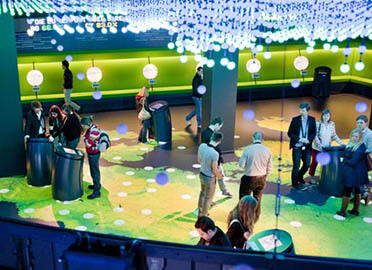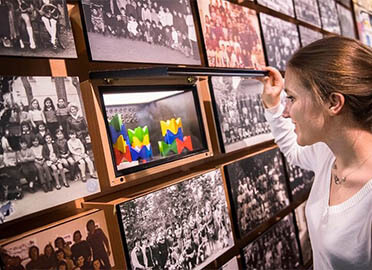Berlin Wall
The fall of the Berlin Wall was an emblematic moment in European history, marking the end of an era of division of the continent. The Berlin Wall divided Germany and Europe from 1961 to 1989. After its fall during the night of 9 November 1989, segments of the wall have been installed in various parts of the world, symbolising the importance of unity over division.
History of the two original segments of the Berlin Wall
Two sections of the Berlin Wall can be found beside the visitors’ entrance to the Hemicycle.
One of these original segments of the Berlin Wall was donated by the city of Berlin to the European capital as a symbolic gesture to mark European reunification. After being removed from its original location at the Potsdamer Platz in Berlin, it was presented to the Brussels public in Leopold Park on 22 April 2004, the day before the accession of ten new countries to join the European Union.
The second original segment of the Berlin Wall was part of an exhibition organised in the Place du Luxembourg to commemorate the 20th anniversary of the fall of the wall in November 2009. Following the exhibition, this piece was acquired by the Belgian State, while another piece from the exhibition was acquired by the European Commission and is now exhibited outside its headquarters, at the Berlaymont building.
The two pieces, the first donated by the city of Berlin and the second that came to Brussels to the exhibition, were relocated to their current place in 2021 as part of a project to protect them, co-organised by Belgian State, the Brussels Capital Region and the European Parliament.
Now symbols of the commitment to peace, freedom, and democracy, the portions of wall are covered with graffiti and inscriptions.
History of the Berlin Wall
The Berlin Wall was a physical and ideological barrier that divided East and West Berlin for 28 years. Built by the East German government, the wall stopped citizens from escaping to West Germany. Its fall on the night of 9 November 1989 led to the reunification of East and West Germany one year later. Within two years, every communist regime in Europe had fallen, paving the way for countries to join the European Union in 1995, 2004, 2007 and 2013.
Berlin wall
How to get there
Brussels-Luxembourg serves the European Parliament


